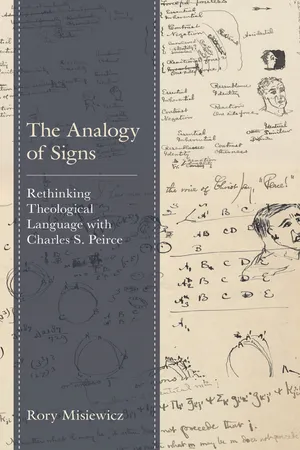
eBook - PDF
The Analogy of Signs
Rethinking Theological Language with Charles S. Peirce
- 313 pages
- English
- PDF
- Available on iOS & Android
eBook - PDF
About this book
The longstanding debate over how God-talk is intelligible gravitates around how we should understand the putative answer, "by analogy." For some contemporary Christian theologians, analogy involves an ontological claim about creaturely and divine being (i.e., an analogy of being). For others, it involves a semantic or syntactical structure that legitimates the linguistic performances associated with analogy (i.e., a grammatical analogy). Still others appeal to faith in God's self-disclosure in Jesus Christ (i.e., an analogy of faith).
Rory Misiewicz argues that all of these approaches fall flat in their explanatory efforts. He draws upon the work of American philosopher Charles Sanders Peirce to rethink the relation between God and human beings. He argues that Christian theologians may view that relation as being established by an "analogy of signs": both God and human beings are univocally involved in semiosis, or sign-process, and the confirmation of God's semiotic identity is found in the revelation of God in the person of Jesus, the incarnate Son of God. Therefore, ordinary analogical language is intelligible, for divine signs are commensurate with human signs.
Rory Misiewicz argues that all of these approaches fall flat in their explanatory efforts. He draws upon the work of American philosopher Charles Sanders Peirce to rethink the relation between God and human beings. He argues that Christian theologians may view that relation as being established by an "analogy of signs": both God and human beings are univocally involved in semiosis, or sign-process, and the confirmation of God's semiotic identity is found in the revelation of God in the person of Jesus, the incarnate Son of God. Therefore, ordinary analogical language is intelligible, for divine signs are commensurate with human signs.
Frequently asked questions
Yes, you can cancel anytime from the Subscription tab in your account settings on the Perlego website. Your subscription will stay active until the end of your current billing period. Learn how to cancel your subscription.
No, books cannot be downloaded as external files, such as PDFs, for use outside of Perlego. However, you can download books within the Perlego app for offline reading on mobile or tablet. Learn more here.
Perlego offers two plans: Essential and Complete
- Essential is ideal for learners and professionals who enjoy exploring a wide range of subjects. Access the Essential Library with 800,000+ trusted titles and best-sellers across business, personal growth, and the humanities. Includes unlimited reading time and Standard Read Aloud voice.
- Complete: Perfect for advanced learners and researchers needing full, unrestricted access. Unlock 1.4M+ books across hundreds of subjects, including academic and specialized titles. The Complete Plan also includes advanced features like Premium Read Aloud and Research Assistant.
We are an online textbook subscription service, where you can get access to an entire online library for less than the price of a single book per month. With over 1 million books across 1000+ topics, we’ve got you covered! Learn more here.
Look out for the read-aloud symbol on your next book to see if you can listen to it. The read-aloud tool reads text aloud for you, highlighting the text as it is being read. You can pause it, speed it up and slow it down. Learn more here.
Yes! You can use the Perlego app on both iOS or Android devices to read anytime, anywhere — even offline. Perfect for commutes or when you’re on the go.
Please note we cannot support devices running on iOS 13 and Android 7 or earlier. Learn more about using the app.
Please note we cannot support devices running on iOS 13 and Android 7 or earlier. Learn more about using the app.
Yes, you can access The Analogy of Signs by Rory Misiewicz in PDF and/or ePUB format, as well as other popular books in Theology & Religion & Literary Criticism Theory. We have over one million books available in our catalogue for you to explore.
Information
Table of contents
- Cover
- The Analogy of Signs
- The Analogy of Signs: Rethinking Theological Language with Charles S. Peirce
- Copyright
- Dedication
- Contents
- List of Figures and Table
- Acknowledgments
- Abbreviations
- Chapter 1
- Introduction
- Part I Guidelines for a Successful Analogy
- Chapter 2
- How Analogy Works
- Part II Influential Positions on Theological Analogy and Their Inadequacies
- Chapter 3
- Analogia Entis
- Chapter 4
- Grammatical Thomism and Analogy
- Chapter 5
- Analogia Fidei
- Part III The Peircean Alternative for Theological Analogy
- Chapter 6
- Peirce’s Philosophy and Intelligibility
- Chapter 7
- Analogia Signorum
- Conclusion
- Bibliography
- Index
- About the Author